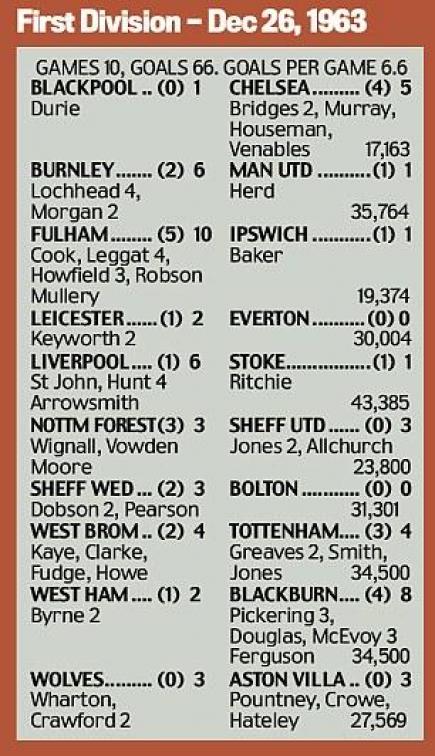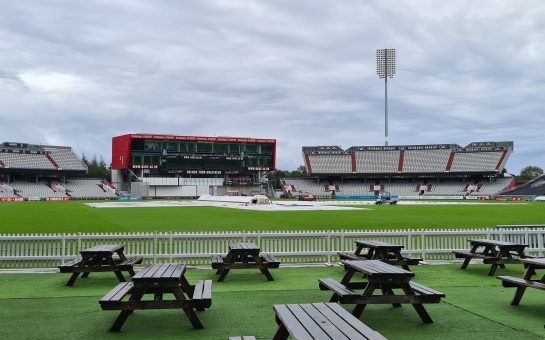On Boxing Day 1860, the world’s oldest and second oldest clubs – Sheffield FC and Hallam FC – played the first ever competitive club match.
It finished with a 2-0 victory for Sheffield at Sandygate Road, who prevailed despite fielding fewer men. For several years as the sole pioneers of club football, the players of Sheffield FC had only ever faced each other – not opposition players.
But in 1860 a tradition was established and Christmas Day and Boxing Day double-headers became a regular part of the calendar. By 1963, which saw the most remarkable set of Boxing Day results, games on the 25th had all but fallen out of favour
On that day in 1963, 157 goals were scored in 39 games. The First Division accounted for 66 of these goals. Too much Christmas pudding, perhaps…

While the quality of football played that day may have been called into question, there is no doubt that it would have been quality entertainment.
That was emphasized when, two days later when the reverse fixtures were played, Manchester United demolished Burnley 5-1, Ipswich overcame Fulham 4-2 and West Ham bounced back to defeat Blackburn 3-1.
In 1996, rugby league moved from a winter season to the summer, meaning that the classic Boxing Day derbies of St Helens vs. Wigan, Leeds vs. Wakefield, Hull FC vs. Hull KR and Widnes vs. Warrington all became absent.
This left a void for rugby league fans. Although the quality of the game has no doubt improved since the move to summer, the enchantment of a festive derby has been sorely missed by many.
Sport is, after all, an entertainment industry, and, in football at least, the more goals, the better the value for money. For football fans across the UK, the festive period just wouldn’t be the same without the beautiful game.
While teams across Europe use a winter break to take inventory, rest and recuperate, teams across England and Wales ramble on, aiming to pick up points that are often regarded as the most important in the season.
The Boxing Day program is one of the key events of the football calendar; one of the first fixtures that fans eyes are drawn to when the lists are announced in June is that of December 26th. It comes as a welcome respite from the monotony of distinctly average Christmas TV –The Royle Family excluded – and excessive poultry consumption.
For many football addicts, it makes Christmas.
For many managers, however, it means a hectic mash-up of fixtures. This year, for instance, Premier League teams will play four times in the space of nine days: three league clashes followed by the magic of the FA Cup third round on the first weekend of January.
The winter fixtures are where teams usually gain – or alternatively, lose – momentum. They are a key period for every team, especially in a competition as competitive as the Premier League.
However, over the past several years, the stagnation of the England team has been used to reinforce the need for a winter break.
Is the reason other European nations such as Spain and current world champions Germany enjoy so much success because the majority of their players get the opportunity to put their feet up over Christmas – to spend time with their families and iron out any niggling injuries, whereas England’s elite are out on the hard turf with just a days’ worth of rest in-between.
And while players undoubtedly need rest periods, two weeks off over Christmas would only lead to congestion in the fixture list later in the season, which, in turn, would only damage an England squad taking part in a summer tournament.
After his side’s victory over Hull, United manager Louis van Gaal, who has managed some of Europe’s most prestigious clubs in the form of Ajax, Barcelona and Bayern Munich, bemoaned the fact that the Reds have to play.
“I am not happy – but I cannot change it – I don’t think it is good for the players,” said the 63-year-old Dutchman.
“I have a wife, kids and grandchildren, and I cannot see them at Christmas.
“But I want to work in the Premier League, so I have to adapt, and I shall adapt.”
Perhaps, if United were involved in European competition this term, Van Gaal’s frustration would be more understandable. But, as it is, United should have the squad more than capable of handling the festive match-ups: hosting Newcastle before travelling to Tottenham and Stoke respectively.
Van Gaal, like many other mangers in the echelons of English football, may wish that a winter break was enforced, that the time could be used to recoup after a tough first stanza of a season and that players would not have to play in the depths of winter – when injuries and strains inevitably increase in their regularity.
But for the fans, those heated, unpredictable encounters are cherished. They are a fabric of our beautiful game. And it should stay that way.
Main image courtesy of RTV via YouTube, with thanks.



